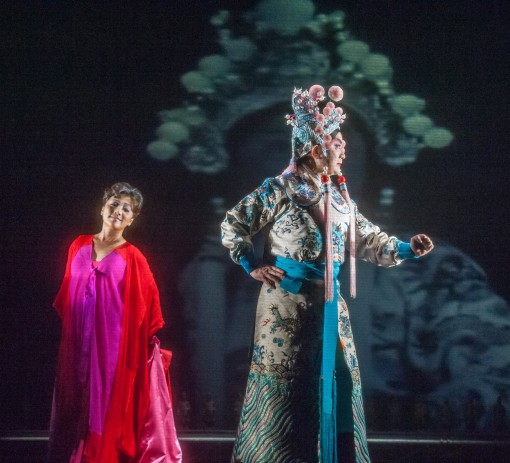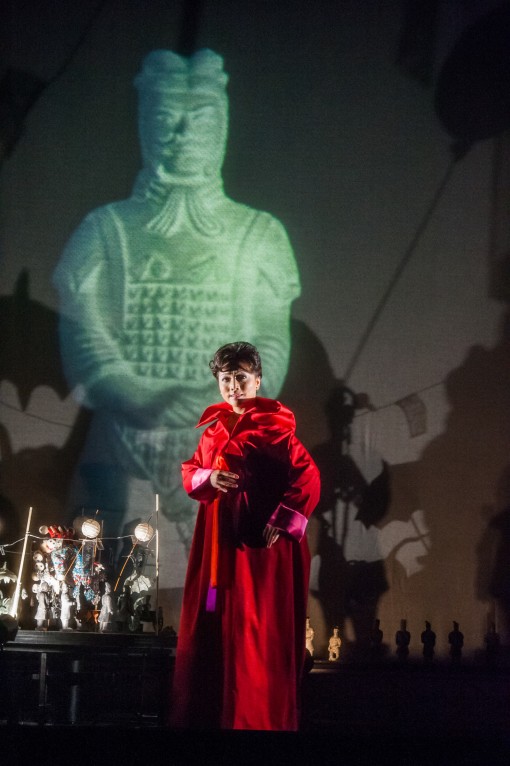“Feng Yi Ting” offers a mesmerizing take on the opera femme fatale at Lincoln Center

Shen Tiemei and Jiang Qihu in Guo Wenjing's "Feng Yi Ting" at the Lincoln Center Festival. Photo: Stephanie Berger
Opera has always been fond of femme fatales, the genre drawing inspiration from lethal women across a wide range of mythologies historical periods, and Biblical sources. One of the most enigmatic recent additions to the repertoire is the figure of Diao Chan, a second-century Chinese beauty credited with saving the Han dynasty when she seduced two dangerous strongmen and moved one to murder the other.
Diao is the heroine at the center of the mesmerizing chamber opera Feng Yi Ting by the Beijing-based composer Guo Wenjing. The opera, which blends Chinese vocal traditions with native and Western instruments, was written in 2004 and received its New York premiere Thursday night at John Jay College as part of the Lincoln Center Festival.
The haunting production was directed by Atom Egoyan with set designs by Derek McLane. Egoyan, best known for unsettling and atmospheric films such as Exotica (1994), says he was attracted by Guo’s sensuous score, which features extensive orchestral interludes that give free rein to a director’s imagination. But there is also plenty to unsettle about the character of Diao, a beauty so radiant that she eclipses the moon. Diao’s godfather uses her as bait to ensnare the powerful warlord Dong Zhou and his godson, General Lü Bu, both wielding dark power over the young emperor.
The action of the one-act opera takes place in the Phoenix Pavilion, the Feng Yi Ting, where Diao encourages the jealous Lü to murder his rival. Her work done, the opera closes on Diao thanking heaven for having allowed her to change history and save the dynasty. But the ever-shifting textures of the music and the otherworldy shadowplay of Egoyan’s production conspire to make her character as unfathomable at the end as it is at the outset. The audience, dazzled by the surface shimmer of Han Feng’s stunning silk costumes, can only guess at the inner life of a woman who is used by men just as she manipulates them, and whose vulnerability is offset by her hunger for power.
The two singing roles, Diao and Lü, are firmly rooted in Chinese opera, while in the pit Guo uses a chamber ensemble of Western and Chinese instruments. As highly stylized arias give way to delicately colored instrumental interludes, the effect is at times cinematic, with the music seeming to pan in and out of a specific time and place.
The character of Diao is cast for a singer from the Sichuan opera tradition and was here sung by the fiercely elegant Shen Tiemei, a celebrated soprano and one-time delegate of the National People’s Congress. Singing with the reedy timbre particular to Chinese opera, Shen made light of the exuberant vocal acrobatics required of her part. A fine actress, with feline movements and a pair of magnificently expressive hands, she brought out the universal pathos of Diao as an intelligent woman trapped in a patriarchal world.
Countertenor Jian Qihu, by contrast, is so rigid with ornamental splendor that he makes his entrances motionless atop a gliding conveyor belt. A representative of the Bejing opera tradition, his vocal lines are characterized by cleaner, less ornate lines, and more concentrated emotion. His dense, golden timbre made a good foil for Shen’s bright and trenchant voice.
McLane’s set and Matthew Frey’s evocative lighting maintained a disquieting interplay of light and shadow, surface and depth. Small terracotta figurines of warriors and horses — modeled on the famous Terracotta Army of Xian — were lit and filmed from different angles, with shadows and video imagery by Tsang Kin-Wah projected onto the walls and translucent scrims. Two carousels carrying figurines represented the rivals for Diao’s affection. When she gently set them in motion, sending hypnotic shadows spinning around her, she became not only the puppetmaster, but also a sorcerer’s apprentice, releasing spirits beyond her control.
In the score, Guo also performed a number of illusionist tricks, blending colors so artfully that it was sometimes hard to say where Shen’s voice ended and an erhu solo began, or to distinguish Western and Chinese instruments. Conductor Ken Lam drew a finely nuanced performance from Ensemble ACJW supplemented by four soloists from China and Malaysia on traditional Chinese instruments.
Egoyan and McLane first collaborated on an opera for Toronto Opera’s Salome in 1996. Here, they introduced a femme fatale from a tradition less familiar to opera audiences, but one every bit as fascinating, touching and terrifying.
Feng Yi Ting will be repeated 7:30 p.m. Friday and Saturday at the Gerald W. Lynch Theater at John Jay College. 212-721-6500 / lincolncenterfestival.org

Shen Tiemei in "Feng Yi Ting." Photo: Stephanie Berger